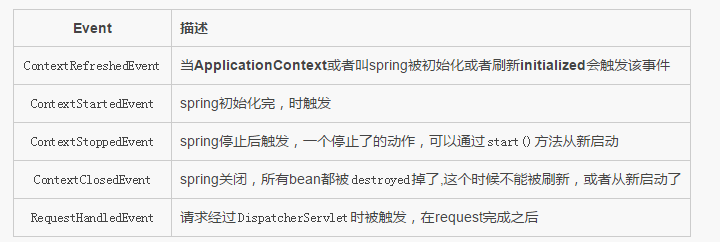Maison >Java >javaDidacticiel >Spring 注解事件Event
Spring 注解事件Event
- 高洛峰original
- 2016-11-22 15:37:021587parcourir
基础支持
先来看看支持哪些默认事件

程序1(Service)
先看看程序
ApplicationEventPublisher这个是spring的东西,需要注入来进行发送 因为实现了ApplicationEventPublisherAware所以setApplicationEventPublisher这个方法会自动帮我们调用,拿到广播发送者
/**
* @author Carl
* @date 2016/8/28
* @modify 版权所有.(c)2008-2016.广州市森锐电子科技有限公司
*/public class EmailService implements ApplicationEventPublisherAware { private List<String> blackList; private ApplicationEventPublisher publisher; public void setBlackList(List<String> blackList) { this.blackList = blackList;
} public void setApplicationEventPublisher(ApplicationEventPublisher publisher) { this.publisher = publisher;
} /**
* 具体广播类
* @param address
* @param text
*/
public void sendEmail(String address, String text) { if (blackList.contains(address)) {
BlackListEvent event = new BlackListEvent(this, address, text);
publisher.publishEvent(event); return;
} // send email...
}
}程序2(Event)
这里也是需要继承ApplicationEvent,并且里面可以实现自己的一些必要参数等等,让在收到广播时进行获取,当然通过source也可以的
/**
* @author Carl
* @date 2016/8/28
* @modify 版权所有.(c)2008-2016.广州市森锐电子科技有限公司
*/public class BlackListEvent extends ApplicationEvent {
private String address;
private String test;
public BlackListEvent(Object source, String address, String test) {
super(source); this.address = address; this.test = test;
} public String getAddress() { return address;
} public void setAddress(String address) { this.address = address;
} public String getTest() { return test;
} public void setTest(String test) { this.test = test;
}
}程序3(receiver)
用spring还是得遵循他一套规范,那么接收者的,还得实现ApplicationListener接口,那么所有收到泛型广播的对象,都会转发onApplicationEvent接口里面来的
当然了spring想得很周全,不一定通过实现ApplicationListener这个类,在bean类里面加入注解@EventListener
/**
* @author Carl
* @date 2016/8/28
* @modify 版权所有.(c)2008-2016.广州市森锐电子科技有限公司
*/public class BlackListNotifier implements ApplicationListener<BlackListEvent> {
private String notificationAddress;
public void setNotificationAddress(String notificationAddress) {
this.notificationAddress = notificationAddress;
} @EventListener
public void onApplicationEvent(BlackListEvent event) { // notify appropriate parties via notificationAddress...
System.out.println("onApplicationEvent, some thing I receive:" + event.getAddress() + ",text:" + event.getTest());
} @EventListener(condition = "#event.test == 'foo'") public void onApplicationCustomerEvent(BlackListEvent event) {
System.out.println("onApplicationCustomerEvent,some thing I receive:" + event.getAddress() + ",text:" + event.getTest());
// notify appropriate parties via notificationAddress...
} @EventListener({ContextStartedEvent.class, ContextRefreshedEvent.class}) public void handleContextStart() {
System.out.println("-------------handleContextStart");
} /**
* 参数可以给BlackListEvent 可以不给
*/
@EventListener(classes = {BlackListEvent.class}) public void handleBlackListEvent() {
System.out.println("-------------handleBlackListEvent");
}
}@EventListener
解析一下这个注解怎么用,犹如上面的程序,除了实现接口外,可以通过@EventListener注解来实现
condition可以使用SpEL表达式,就是当满足条件才执行
classes当触发event对象是这个class才会被执行
程序4(config bean)
这里主要对一些服务以及接受广播bean的注册,以便接受
/**
* 配置
* @author Carl
* @date 2016/8/28
* @modify 版权所有.(c)2008-2016.广州市森锐电子科技有限公司
*/@Configurationpublic class AppConfig { @Bean
public EmailService emailService() {
EmailService s = new EmailService();
List<String> emails = new ArrayList<>(3);
emails.add("known.spammer@example.org");
emails.add("known.hacker@example.org");
emails.add("john.doe@example.org");
s.setBlackList(emails); return s;
} @Bean
public BlackListNotifier notifier() {
BlackListNotifier notifier = new BlackListNotifier();
notifier.setNotificationAddress("blacklist@example.org"); return notifier;
}
}Déclaration:
Le contenu de cet article est volontairement contribué par les internautes et les droits d'auteur appartiennent à l'auteur original. Ce site n'assume aucune responsabilité légale correspondante. Si vous trouvez un contenu suspecté de plagiat ou de contrefaçon, veuillez contacter admin@php.cn
Article précédent:Java优雅的Optional空指针处理Article suivant:Java中hashcode()方法的前生与今世

